breaking news
DRC: school education, free of charge VS quality (Raïssa Malu)
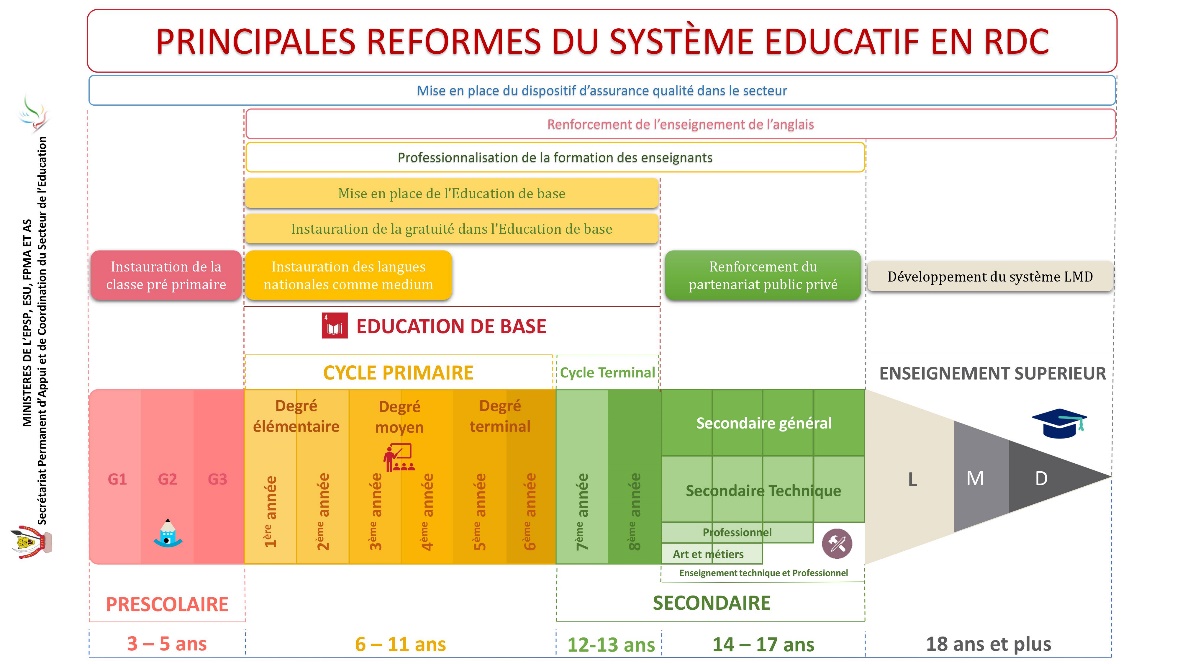
[TRIBUNE] – Back in school, it’s about 3 weeks and at the Ministry of Primary, Secondary and Professional Education (EPSP), it is currently the effervescence. The 2019-2020 school year is being prepared under the following theme: « Good governance of the education system and effective leadership in the implementation of free basic education ». An entire program !
Before, it was « quality ». Today, the word you will hear on everyone’s lips is « free ». We wish it, we dread it and we do not care too much. « Do we have the means to set up free education in the DRC? »
I assure you (or I will disappoint you), I will not answer this question here. No. Because all actors and specialists in education meet in Kinshasa next week to discuss at the second national forum on free basic education. And immediately after, from August 21st to 24th, the national and provincial executives of the Ministry of Primary, Secondary and Vocational Education will participate in the National School Promotion Assizes 2019 (an event organized every year) to decline this program in action.
Instead, I suggest you dive once again into the heart of the Congolese education system to discover the many facets. (This was the program I had set for the dry season or summer months.)
Recently, a friend (benevolent) shared with me a report on a primary school in a certain village in the north of the country built of forest materials (said modestly in the documentary). The school is modestly equipped (a euphemism). The six « classes » have a kind of picture. Most of the children come there barefoot. Many are absent because their parents are unable to pay school fees of 1000 FC and 1500 FC depending on the level (about 0.59 USD and 0.89 USD).
In these places, teachers spend a significant portion of their salary (less than $ 100) on the move to touch it at the « nearest » center. And I do not talk about many problems of insecurity if the village has the misfortune to be in a strategic area, rich in some natural resources for example.
The day before, I had a work meeting where my colleagues told me about their visit to a state-of-the-art school complex recently inaugurated in another province in the south of the country. They were impressed, because within the walls of the school, WiFi is available for free for everyone. The school offers digital classes. The different sections and options are all equipped with teaching aids. The school has access to water and electricity (should I mention it?). And teachers receive each end of the month a sack of flour in addition to their salary (in our regions, it is a definite advantage).
Across the country, the first situation is much more common than the second (for now). But, you also have a good share of schools, mainly in urban or semi-urban areas, which are in the panoply of intermediate situations. This gives you an idea of the big gaps that agents and actors within the Ministry of the EPSP have to make daily.
Faced with such situations, the current reaction is sadness, indignation and anger. Who are the responsibles ? What does the government do ? What is the purpose of funding education? we cry out. Yet, school is not an isolated system of society. If the society has difficulties, the school has difficulties. If society thrives, well, do you think the school can still have problems? I explain to you.
The problem that « keeps me awake » is that parents entrust us with millions of children each year (and they will give us millions more if the free measure is applied) and many of these children, when they leave our education system they have barely learned more than if they chose to stay at home. It’s sick, is not it?
Looking to get back to sleep, I immersed myself in the book of Sir Ken Robinson, renowned English specialist in education, « Change the school: the revolution that will transform education. » And as I finally began to relax, I came across this: « If you run an education system based on standardization and conformism, which aims to suppress individuality, imagination and creativity, do not be surprised that he succeeds.
It had the effect of a bomb on me. It’s like he said, « Auntie. Here you are agitating to improve the quality of science and mathematics education thinking that you will train Congolese and Congolese, but you can not do it! Perhaps you will reach the level of the industrialized countries, but it will be to better suffer the setbacks of their own system. At that moment, you know, we start frantically turning the pages of the book to assess the extent of the damage (Doctor, will I die?).
The educational system that we have all widely adopted is modeled on the model of mass production, the model of the factory: same program, same pedagogy and students are evaluated by the yardstick of a single standard. It’s funny, do not you think? We have adopted a system based on a model for the moment that is almost non-existent in our African societies. It’s as if we had put the cart before the horse.
A standardized system has no other purpose than to standardize (but where did we head?) And when we want one thing and its opposite, here is what we harvest: an alarming rate of non-graduates, the disinterestedness of students in certain subjects (science and mathematics, for example), demotivation of teachers (even suicide), decline in the value of university degrees, increased cost of studies, increased unemployment among both graduates and non-graduates. It sticks to African countries, is not it? However, these are also the problems that we find in countries where standardized education systems have been invented and work best overall …
In Africa, we want (exaggerated) worship (academic) and standardized tests, such as the State Exam that our students pass at the end of secondary school. However, specialists note that « the entrepreneurial qualities of a country are inversely proportional to its success in standardized tests. Ah, ah, are not the entrepreneurial qualities the ones we would like to give to all our young people in Africa? (But let them stop all wanting to become public servants and create their own jobs, please). But, while they are important in the contexts of our countries, there is something more important.
Let’s forget for a moment this distinction between industrialized countries and in the process of being. Today, the major challenges of our societies are the same: climate change, preservation of resources, data protection, artificial intelligence, etc. Rich and poor countries, multinationals and SMEs, we all need men and women who can adapt quickly to change and are able to generate new ideas.
To do this, Sir Ken Robinson strikes us not to seek to fix, but to change, not to seek to reform, but to transform our educational systems. How? « To change the education system, it is important to know the nature » (that’s why I knock you out of these articles) and « the education system has a strong potential for innovation, » he says. « It’s not about doing better than before. We must do otherwise. »
The young people (girls and boys) I meet in the Democratic Republic of Congo are ready for innovation. And we, the administrations, the teachers, the politicians, the civil society, the private sector, the technical and financial partners, are we ready to innovate? Epilogue
And me, did I sleep again? Yes and no. The new Science Learning Domain programs developed by the Ministry of Primary, Secondary and Vocational Education offer a pedagogical approach that aims to value what the child, teachers and communities know and possess. The goal is to give students the desire to learn. The approach is to work with those inside the education system to change it.
Only, it is useful that we keep in mind these words of Sir Ken Robinson: « Education is not done in the hemicycles nor through the rhetoric of politicians. It results from what happens between students and teachers at school. »
Science is fun, join us! 😊
PS The cover image of the article was produced by the Permanent Secretary for Support and Coordination of the Education Sector (SPACE). To help you understand, it takes the main reforms underway in the education system in the Democratic Republic of Congo for each level of education. I like this image and I have a lot of fun working and collaborating with the actors of our education system. 😊
As we say here too, we are together! 😊
Raïssa MALU, international consultant in Education
Africa
DRC : Tenders for tailings storage works at MMG Kinsevere
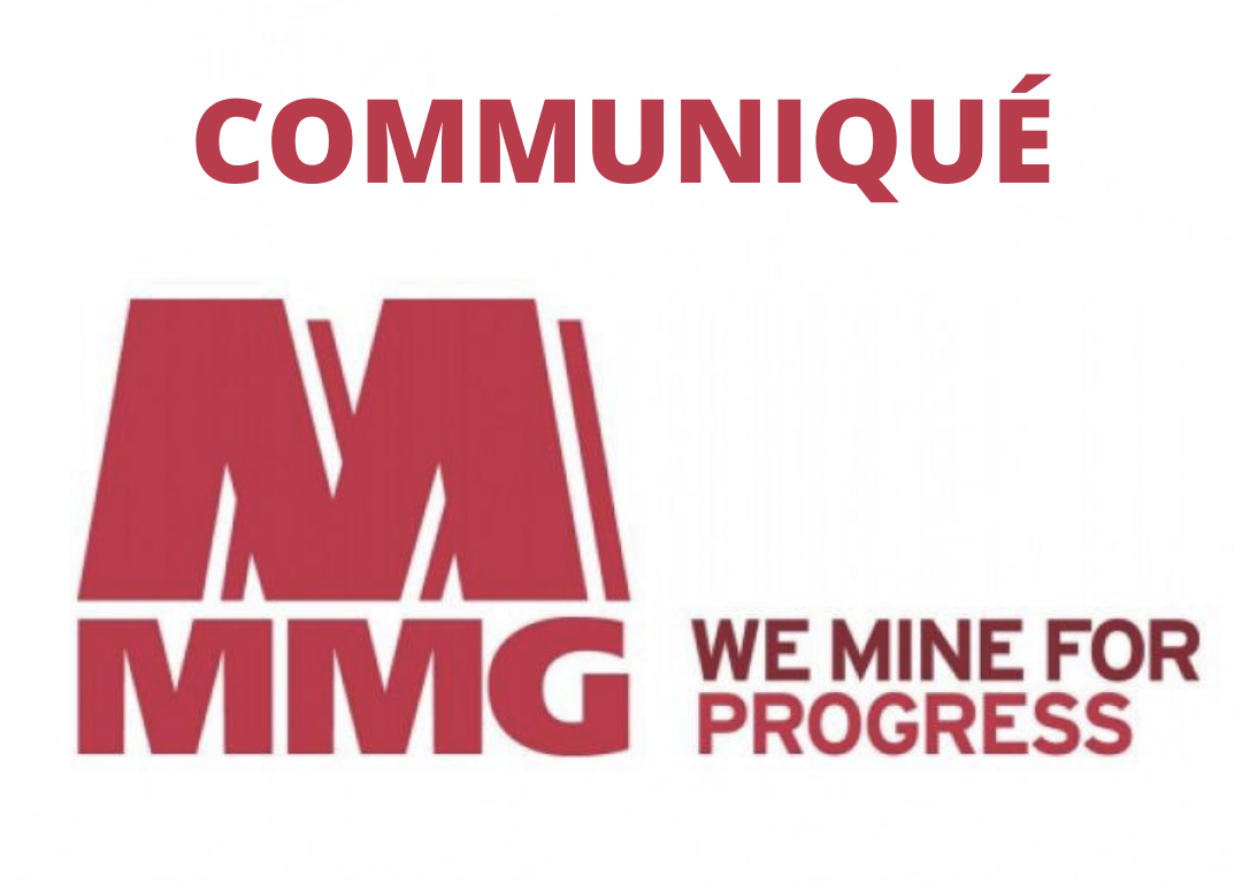
PUBLIC NOTICE – MMG Kinsevere SARL hereby announces to the public within the Democratic Republic of Congo that the following tenders are currently being prepared and finalised for future works to be undertaken at the Kinsevere Mine site.
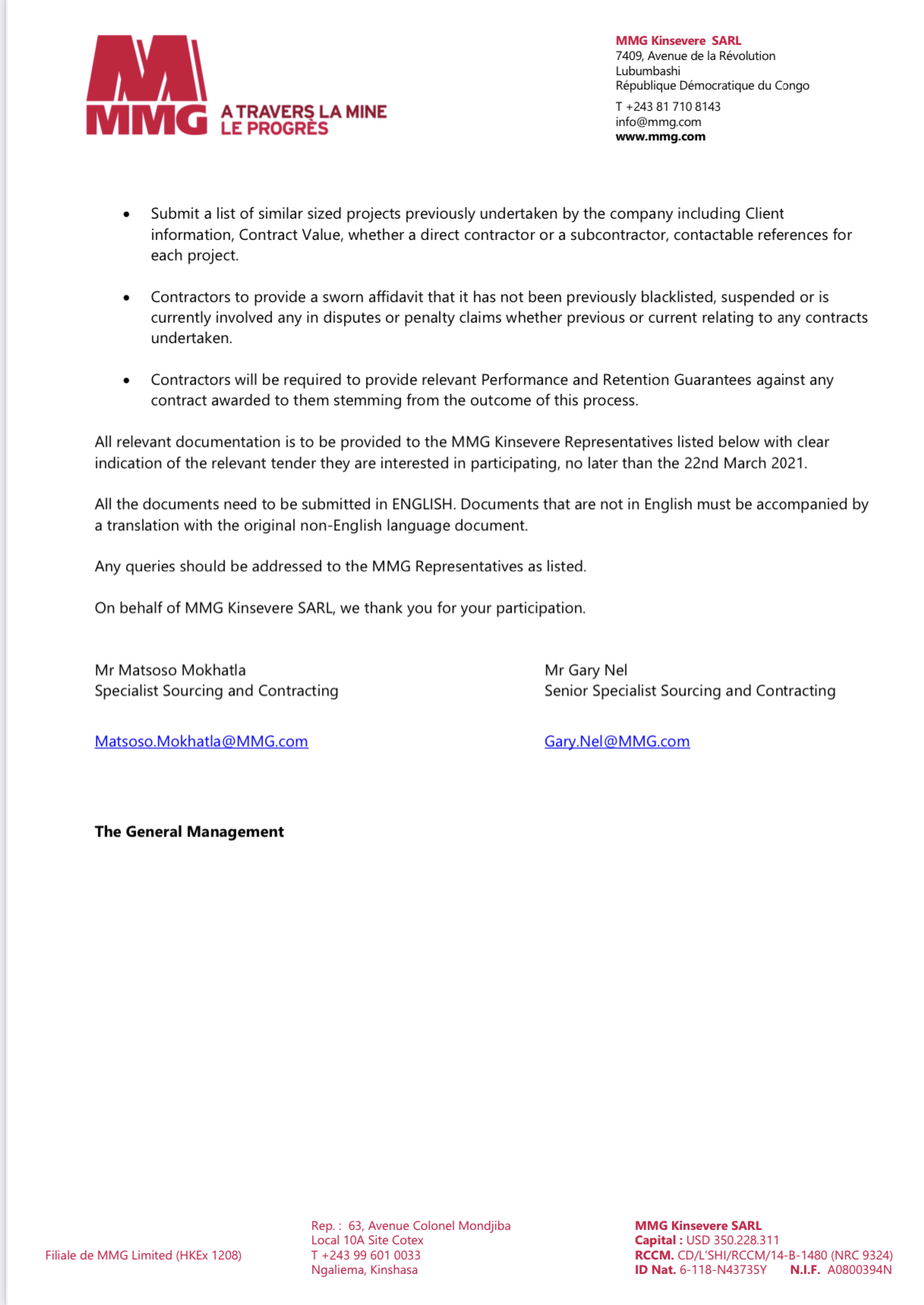
Africa
DRC: Launch of Tender for Laboratory Services At MMG Kinsevere

MMG Kinsevere SARL hereby announces to the public the launch of the tender for Laboratory Services for Mining and exploration.
All intertested and qualifying entities need to submit their respective company files as per the below list of requirements detailing their expression of interest for the above tender by no later than 10 March 2021.

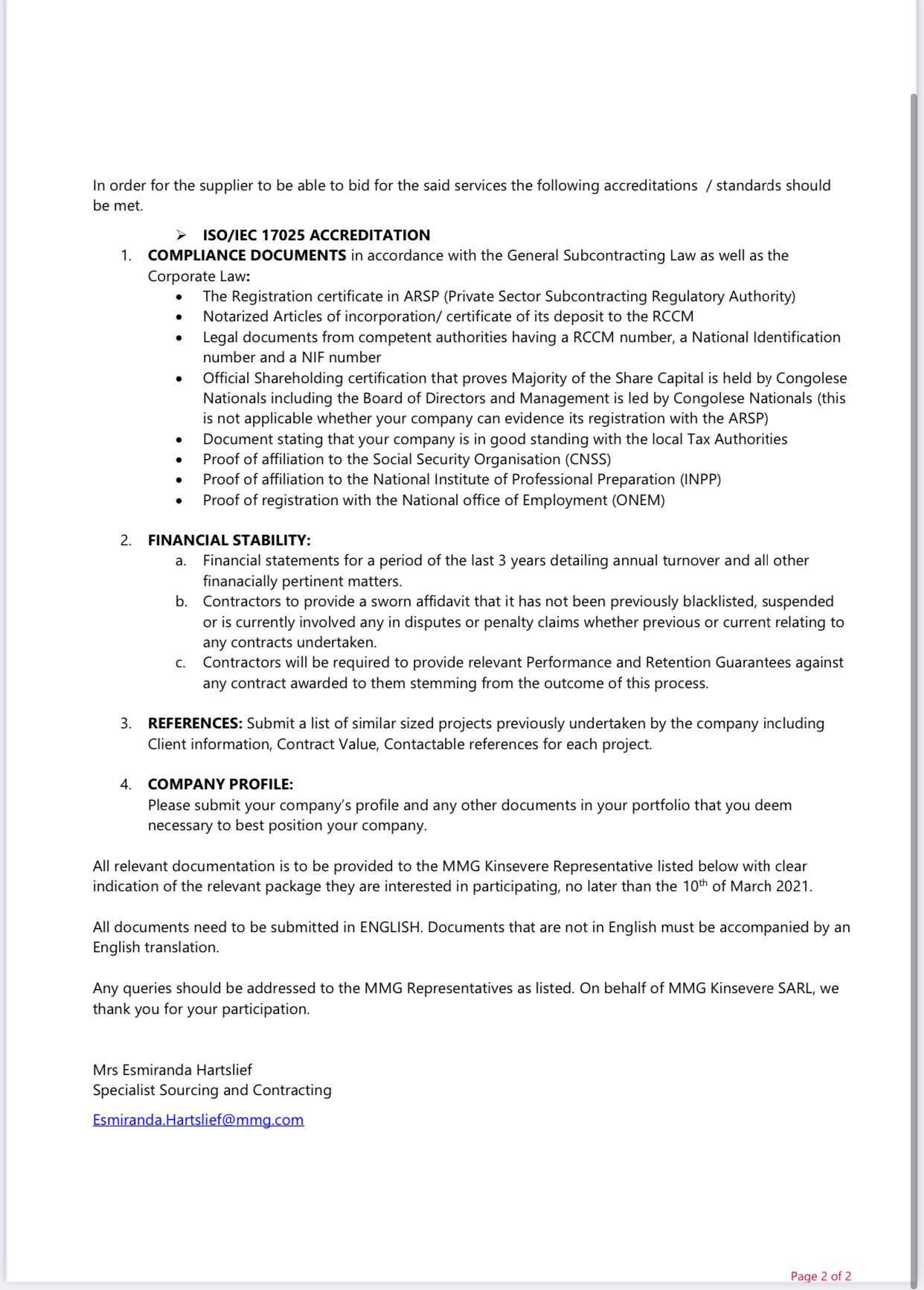
breaking news
DRC: Launch of tender for exploration drilling at MMG Kinsevere
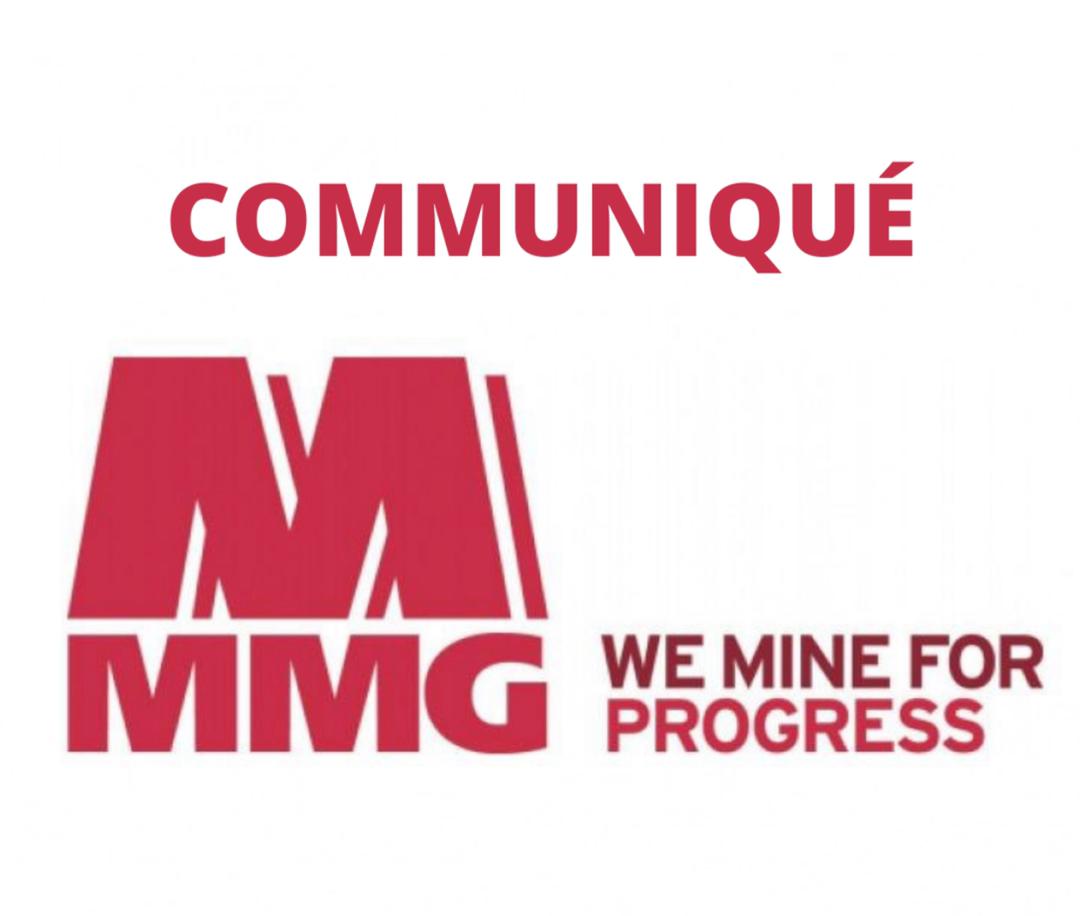
PUBLIC NOTICE – MMG Kinsevere SARL hereby announces to the public within the Democratic Republic of Congo the launch of the of tender for Exploration Drilling
All interested and qualifying entities need to submit their respective company files as per the below list of requirements detailing their expression of interest for the above tender by no later than 03rd of March 2021.



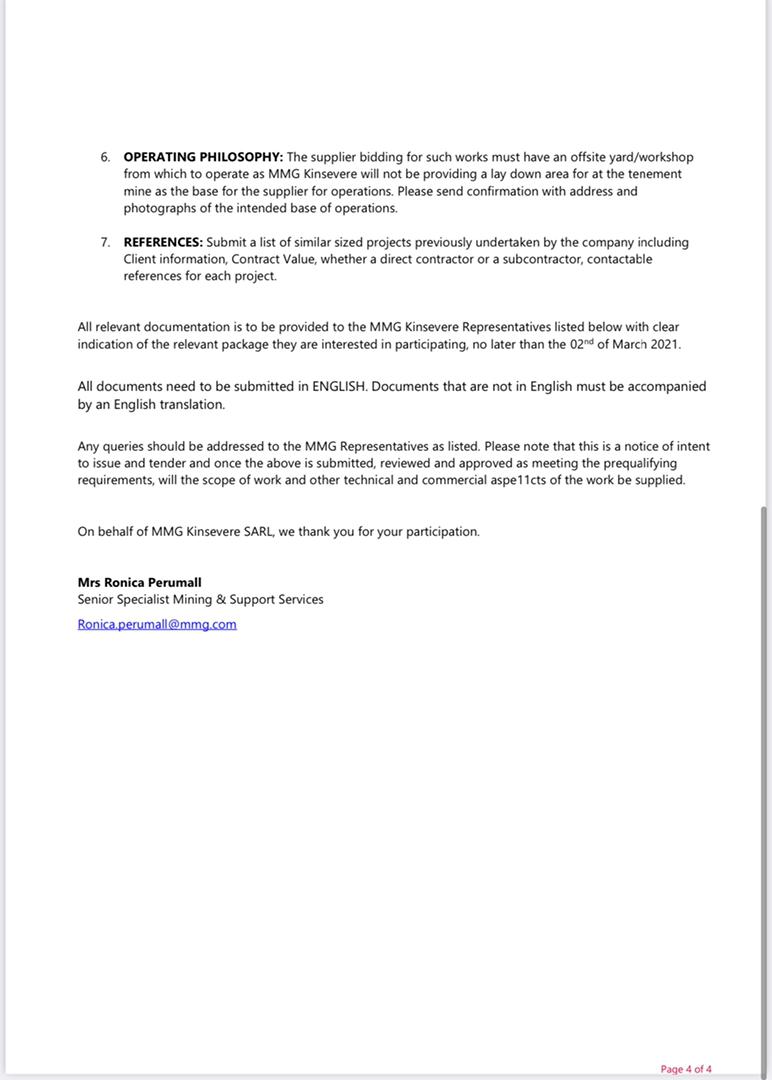
-

 breaking news5 ans ago
breaking news5 ans agoDRC: dam Zongo II, a project poorly evaluated technically and financially (study)
-

 breaking news5 ans ago
breaking news5 ans agoDRC: International Banker Awards SOFIBANQUE Two 2019 Best Bank Awards
-

 breaking news5 ans ago
breaking news5 ans agoDRC: Government incorporates IDEF into the cost of airfare
-

 Banks5 ans ago
Banks5 ans agoDRC: Equity Bank strengthens its partnership with VISA inc.
-

 breaking news5 ans ago
breaking news5 ans agoDRC: Dandy Matata calls for a state of emergency in the education sector
-

 breaking news5 ans ago
breaking news5 ans agoDRC: DIVO launches renovations to the Tata Raphael stadium
-

 breaking news5 ans ago
breaking news5 ans agoDRC: ACERD expects renewable energy investment opportunities
-
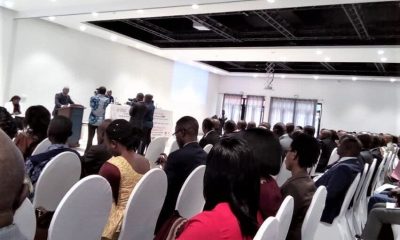
 breaking news5 ans ago
breaking news5 ans agoDRC: Kangudia launches Fiscal Year 2020 Budget Orientation Seminar




